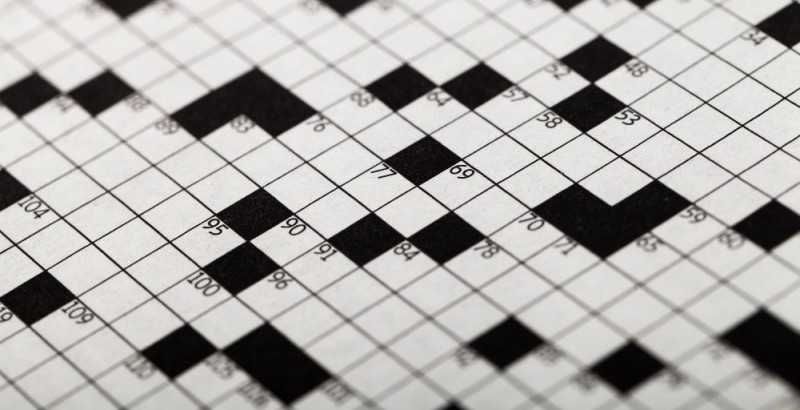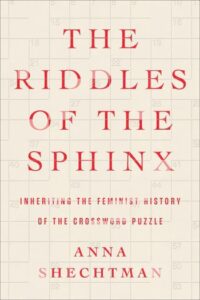
Unsolvable Puzzles: Anna Shechtman on the Feminist Psychology Behind Crosswords
Hannah Zeavin Talks to the Author of “The Riddles of the Sphinx”
Anna Shechtman’s The Riddles of the Sphinx is, so I am told, a memoir of recovery from anorexia and a group biography of the women who developed crossword puzzles. But this is a book that transcends its essential categories: it’s not just a memoir because it allows the reader to move between the individual and the collective in a quest to reoccupy forms. What is it to reoccupy the form of your own body and your concept of femininity? What is it to reoccupy masculinized forms of labor, of genius? To reoccupy sororal connections—in our families, our milieus, with women known and unknown to us?
The book demands that we ask, what can we hold in common, and how can we reject an inheritance that isn’t particularly pleasant? This is a book that doesn’t shy from these essential questions to the feminist project in the 2020s. Shechtman and I met on a Wednesday afternoon to speak about the, in her words, high-class language game we share—psychoanalysis—and the one we don’t—crosswords.
*
Hannah Zeavin: There are so many themes and histories that crisscross in this book. And I don’t mean to make a bad pun on the crossword, but it is a set of interlocking constructions. It’s an intellectual puzzle, much like the crossword, which is both its guiding metaphor and its guiding history. And indeed, it’s the way the book is packaged, but that packaging doesn’t do justice to its full complexity. The book is inheriting a feminist tradition, a tradition that is actually multiple, so I’m wondering if, before we get into all that, you can tell me a little bit about how you began to construct the book?
Psychoanalysis was essential for understanding the cage and its contours, but an inadequate tool for getting out of it.
Anna Shechtman: You’re right that there are many entry points into the book as a function of its complicated structure. Years ago, when I was Will Shortz’s assistant at the Times, I was approached to write a book, and it was pretty clear to me that it was meant to be a book by and about “Crossword Girl.” This was peak Girlboss era, and Crossword Girl is highly compatible with that brand of corporate feminism. I was a young woman “making it” in a male-dominated sphere, reshaping an industry in my image. It’s a very salable fiction, and I always thought there was something ugly lurking behind its salability—beyond its focus on me as an individual and not the conditions that made puzzlemaking such a male enterprise. There’s something appealing about a woman who devotes the intensity of her intelligence to a game, who is “neutralizing” her intelligence in that way.
Needless to say, I didn’t write that book, but the proposition forced me to come to terms with this niche brand that I was complicit in building. I had a moment of revulsion when I realized that this agent had clocked me as something that I found to be both cheesy and inconsistent with my politics. The truth is, I am one one of very few women in the crossword scene, but I’m not making it there on my own. There’s a small cohort of us who have been working to open up the puzzle’s lexicon, who have understood crosswords as a political form, patrolling the borders of common knowledge, and who have thought critically about what that means: What is common knowledge? Common for whom?
The possibility of that first book—and my alienation from the Crossword Girl, a feminine ideal that I knew to be linked to my teenage eating disorder—got me thinking about what kind of book I might want to write. I was curious about why, at the age of fifteen, I stopped eating and started writing crossword puzzles. What kind of woman was I trying to become? And how has my relationship to language changed as my sense of what kind of woman I could be changed, as I became a student of feminist history and theory? I thought there might be a book in that story.
HZ: The image that you were making for yourself at age fifteen—an image that you now feel alienated from—is also an image that the reader has in view. About when you decide to stop eating and start making crosswords, you write, “I wanted to see myself as a complex character, someone worthy of inquiry, which is to say attention.” Let’s just pause there.
AS: Something about your saying “Lets just pause there” really made me feel like I should be lying down [laughs].
HZ: One thing that’s so remarkable about this book is that I feel like the whole time that we have you, Anna, 33 years of age, brilliant professor at Cornell, incredibly deft both with the close reading of media and literary forms, like the crossword, and with feminist psychoanalysis—Lacanian bent, i.e. perhaps the hardest to get inside linguistically. And we also have you, able to be present to—and reinhabiting—yourself at age fifteen. And what you just said puts a new spin on that for me, which is that in contemporary psychoanalysis, we might use the term join, you join with the reader and show them yourself at fifteen. And then you proceed to have, across the book, a kind of feminist life arc. You continue to say, “I wanted to be read as unreadable, legible as illegible, understood to be a woman—or really a girl—of mystery.” This image of a valuable woman is that of a woman who is disappearing, and therefore appearing in her disappearance.
AS: That’s wonderful. It really lays out the problem.
HZ: It’s the task you set up so clearly, and so if someone arrives to the book seeking a Girlboss, they have to contend with why they wanted it.
AS: Right, I wasn’t inventing this idea that a woman has to be pathological or exceptional to be attended to. Or the idea that a voracious femininity—a woman with large appetites for all sorts of things (power, sex, knowledge)—is allowed to be unleashed, so long as it comes in a very small container.
HZ: The crossword is fascinating in that way, as the object of your labor, because, of course, it is filled with intellectual capacity, play, vivaciousness, you have your finger on the pulse, not just your pulse, right, but the culture, the collective unconsciousness’ pulse. I love the scenes where you’re getting into these fights about what constitutes a puzzle-worthy word, which is to say, a relevant artifact that enough people will understand.
And of course, you as a young woman, have a very different understanding of that than your older male boss. But moreover, once all that work is done, it’s deleted. You take a puzzle and make it blank for someone else to fill in. And so one of the things that’s running this book is also a series of projections. This is also the cultural fascination with the anorexic, the disappearing woman. The less she exists, the more neutral an object she is, and she can be projected upon.
AS: Anorexia is so complicated because, on one hand, it’s easy to see it as a form of discipline, but it’s also a site of projection. There’s a brilliant book from the seventies by a woman named Hilde Bruch, called The Golden Cage, which I find invaluable, in part because it meticulously describes the physiological fact of the “starving mind” and all the psychological tricks it plays on the anorexic patient. There’s a great introduction to the reprint of that book that talks about anorexia as a form of social discipline: it emerges as a cultural phenomenon at the moment of women’s sexual liberation and the invention of the pill, right when chastity loses its grip on the social definition of a Good or Bad Girl.
But that disciplinary function is displaced onto weight. The ability to determine a woman’s virtue becomes measured by how much or little she eats—not how much she sleeps around. That seems really smart and really right to me, but it doesn’t account for what you’re describing, which is that the smaller the woman gets, or the more erased she gets, the larger role she occupies as a site of fantasy in the cultural imagination. She becomes a puzzle: it’s the blankness of the crossword grid that make us want to fill it in. Did we just address all my anxieties and pathologies?
HZ: We have 25 minutes left in the session, so let’s keep going [laughs]. You just said, and it’s all over the book, that you can read anorexia in so many different ways, but one thing that your book gives us and that I think is rare, is an open, honest account of an individual in treatment, in a family, in a milieu. Anorexia comes up in the memoir sections of the book, often on the heels of sections that deal with crosswords, but it is also this conveyance into psychoanalysis. The way you were treated for anorexia—a passage from psychoanalysis to behaviorist modes—also tells the story of mental healthcare in the United States, which I found fascinating. Anorexia also becomes a theory of overdetermination. It is overdetermined; it’s a symptom. So I’m wondering how you think about anorexia now.
AS: Well, I got interested in psychoanalysis because I wanted to cure myself from anorexia. And at the same time, I know I wanted to stay sick, to outsmart my mental health care professionals who weren’t analysts and were instead trained in more behavioral modes. I was really turned on by Freudian case studies, especially as I was turning myself into a case study for my own scrutiny. I knew that my behavior around food and weight was irrational, but ultimately I found psychoanalysis to be insufficient when it comes to anorexia’s Golden Cage, as Bruch calls it. (“Golden” because it’s associated with all sorts of social privilege—anorexics don’t suffer from food scarcity, even though eating disorders actually affect all populations at an equal rate.)
In my experience, psychoanalysis was essential for understanding the cage and its contours, but an inadequate tool for getting out of it. I needed behavioral intervention. I needed in-patient treatment, which forced me to eat six times a day, over and over again. I also needed the sustained companionship with—and care of and for—the other women I met there.
You could take from my own personal history a rejection of psychoanalysis: it reinforced a kind of self-mythology and narcissism (“I am a case study”). I could have become a strict behaviorist or Foucauldian, but that’s not what happened. What I wanted to do in the book was not only interrogate my own unconscious motives around food and language, but the cultural unconscious that propped up a certain self-mythology around femininity and self-erasure and fueled my disorder.
HZ: One of the ways the book is constructed is through and of the sororal. In order to find yourself and relocate yourself outside of what you thought you would have to be as a woman, to be taken seriously by men, you reinvent a world in which you’re in very intense solidarity with other women. So it makes sense that, after a dedication to your mother and sister, you move to Freud and psychoanalysis on the very first page. You are in a familial drama, the theory of it, its verbal pleasures, the fact that it is a talking cure. Then late in the book you turn hard to the Lacanian feminist tradition, centered on a group of thinkers: Julia Kristeva, Jacqueline Rose Jane Gallop, Helene Cixous, and more. So I want to ask, why Lacanian feminism? Not as cure, but how are they working inside this book?
This is a recovery project—from an eating disorder, from adolescence—and it is also a project of recovering a feminist history.
AS: Part of it is just biographical. I’m moving through my own education and understanding of myself as a woman in the world, and I encounter Kristeva, Cixous, and Irigaray in college and find, perversely, that their theory of language, as intimately attached to female pleasure, appealed to me at a particular time when I was trying to understand myself as newly sexual and yet also wanted to deny my body. So through them, I could access not just pleasure, but a distinctly feminine pleasure that existed almost in the mind only, through word games and the excessive signifying power of language. And I was like, great, done: I am a sex goddess, and I have no need for secondary sex characteristics. This isn’t a critique of those thinkers but an acknowledgement of my misappropriation of them in the service of my anorexia.
I think Lacanian feminists also helped me bypass an earnest register that, at the time, repelled me. They apparently allowed me to “choose door number three”: you don’t have to be a Lean-In feminist; you don’t have to be an earnest, consciousness-raising feminist; you can be this other thing, this wily manipulator of language who doesn’t succumb to the traps of Logos or Pathos. You’re just cool and good with wordplay? Again, I’m describing my college-aged misappropriation of them, in which they allowed me to think that my anorexia—my desire to escape the fact of having a woman’s body—and my desire to be smart in a way that was still attractive to men could be consistent with feminism. This was feminist wordplay in the service of heterosexual foreplay. That’s not necessarily their project.
HZ: The book is, by its end, ambivalent. Yes, it is a conversion narrative, from anorexia to recovery, from social isolation to feminism, but also not properly a conversion narrative because the convert is ferocious in its devotion. There remains an unsolved anxiety about Logos.
AS: That’s right. There’s something that keeps happening when I talk about this as an anorexia memoir. People wonder if I was retraumatized when writing it. And it’s like, no, I had total control over language throughout. But this is a pervasive idea, and I want to say a gendered fantasy, that the process of writing it was ideally unmediated—that I was retraumatized and what you’re reading is all feeling, not thought. As if I was bleeding out on the page in some way. That’s not what this book is, and anyone looking for that is going to be disappointed. And believe me, I’ve already worked my way through all the ways that readers are going to be disappointed. This is not the memoir of a madwoman in the attic; nor is it the memoir of Crossword Girl. It’s something else.
HZ: I wonder if that’s in part because there is a container: this is also a group biography.
AS: Yes, absolutely. The women I write about in this book, had their own, somewhat perverse attachments to language and to patriarchy that they negotiated through wordplay and word games. Many of them found themselves in unpleasant or ugly positions because of their commitment to some version of these attachments. Take, for example, Margaret Farrar, the first editor of the Times’ crossword, who identified so strongly as a wife and mother, and not as a career woman, that she was fired from her job at the paper because she wasn’t willing to identify as a worker. She was a strikebreaker and the Newspaper Guild forced her out. Or, Julia Penelope, a linguist who wrote lesbian separatist crossword puzzles, and was so committed to an essentialist definition of women that she adopted repugnant, transphobic politics.
Part of the book’s project is to demonstrate that the rigidity that defined all of these women’s relationship to language—and to the idea of being a certain kind of woman—led them to really harmful positions. There’s an incredible governing metaphor for this rigidity, which comes from a woman named Ruth von Phul, a crossword puzzle champion and self-taught Joyce scholar, who wrote a haiku that was published in Harper’s late in her life. It says, “What a paradox / is an unbending person / who cannot unbend.” That kind of rigidity, which is emblemized in the crossword puzzle, literally gridded language, can also lead you into really contorted, punishing relationships with yourself and others. Of course my own personal history only confirms this. However much this book is about the fantasy of a disciplined body and a disciplined body of language, it’s ultimately a work of ambivalence, written on behalf of flexibility and unbending.
HZ: You’re earning your ambivalence. You’re learning it. It doesn’t come naturally to the fifteen-year-old. It doesn’t come naturally to many teenagers. Ambivalence, the depressive position, these are things that are developmentally accomplished, through experience. And we live in a world that doesn’t offer much of it to young women. You’re this or you’re that; it’s a kind of hyper-rigid categorization, and it shows up in incredibly pernicious, fascistic gender politics, which you don’t shy away from encountering in your archive. To borrow Leslie Jamison’s phrase, that’s the recovering.
AS: This is a recovery project—from an eating disorder, from adolescence—and it is also a project of recovering a feminist history. Among other things, it’s allowed me to recognize myself as not that original, which is always helpful.
HZ: Yeah, and it also gives you access to tradition.
AS: And thank god for that!
__________________________________

The Riddles of the Sphinx: Inheriting the Feminist History of the Crossword Puzzle by Anna Shechtman is available from HarperOne, an imprint of HarperCollins Publishers.
Hannah Zeavin
Hannah Zeavin is Assistant Professor of the History of Science in the Department of History and the Berkeley Center for New Media at UC Berkeley. She is the author of The Distance Cure (MIT Press) and Founding Editor of Parapraxis. In 2021, she cofounded The Psychosocial Foundation.



















